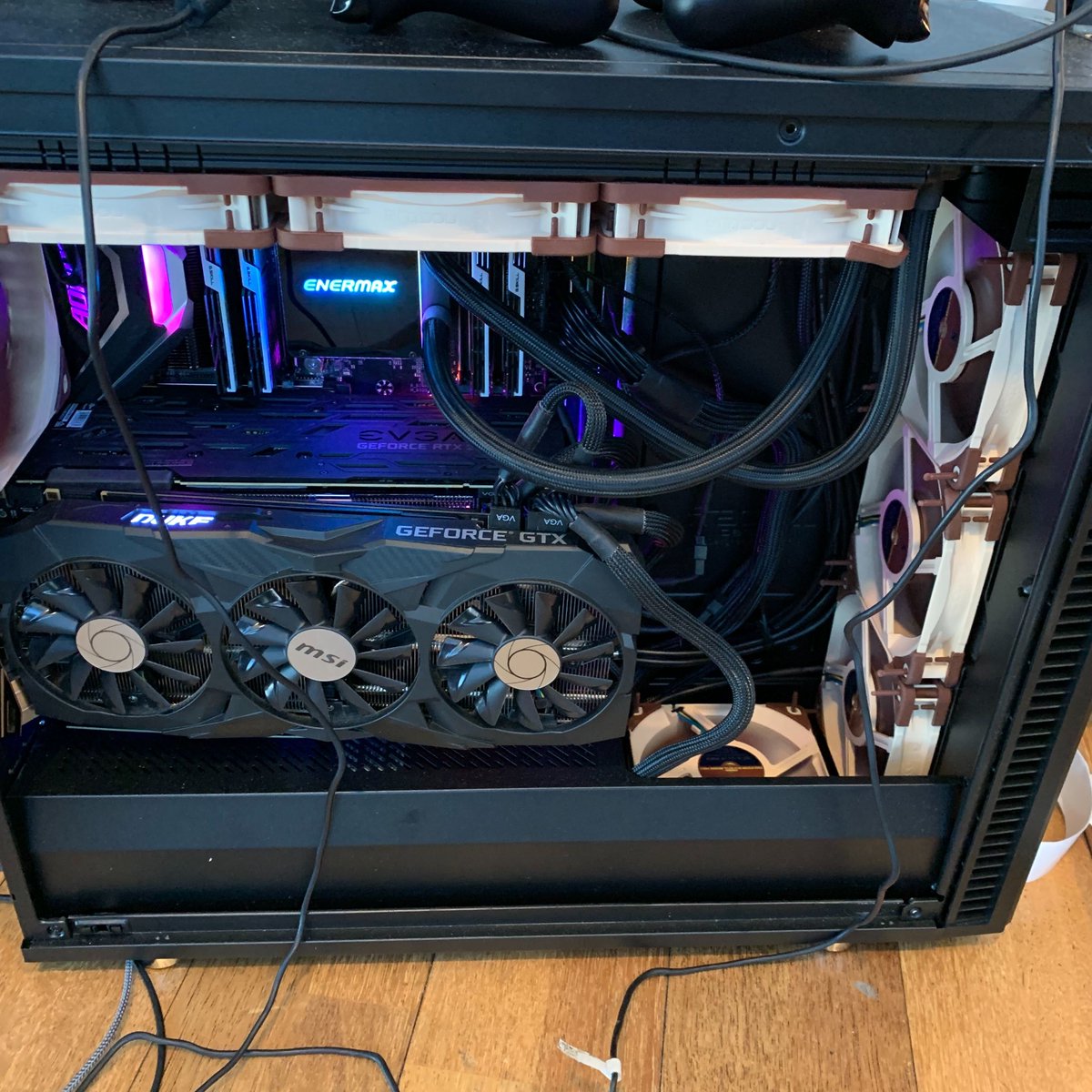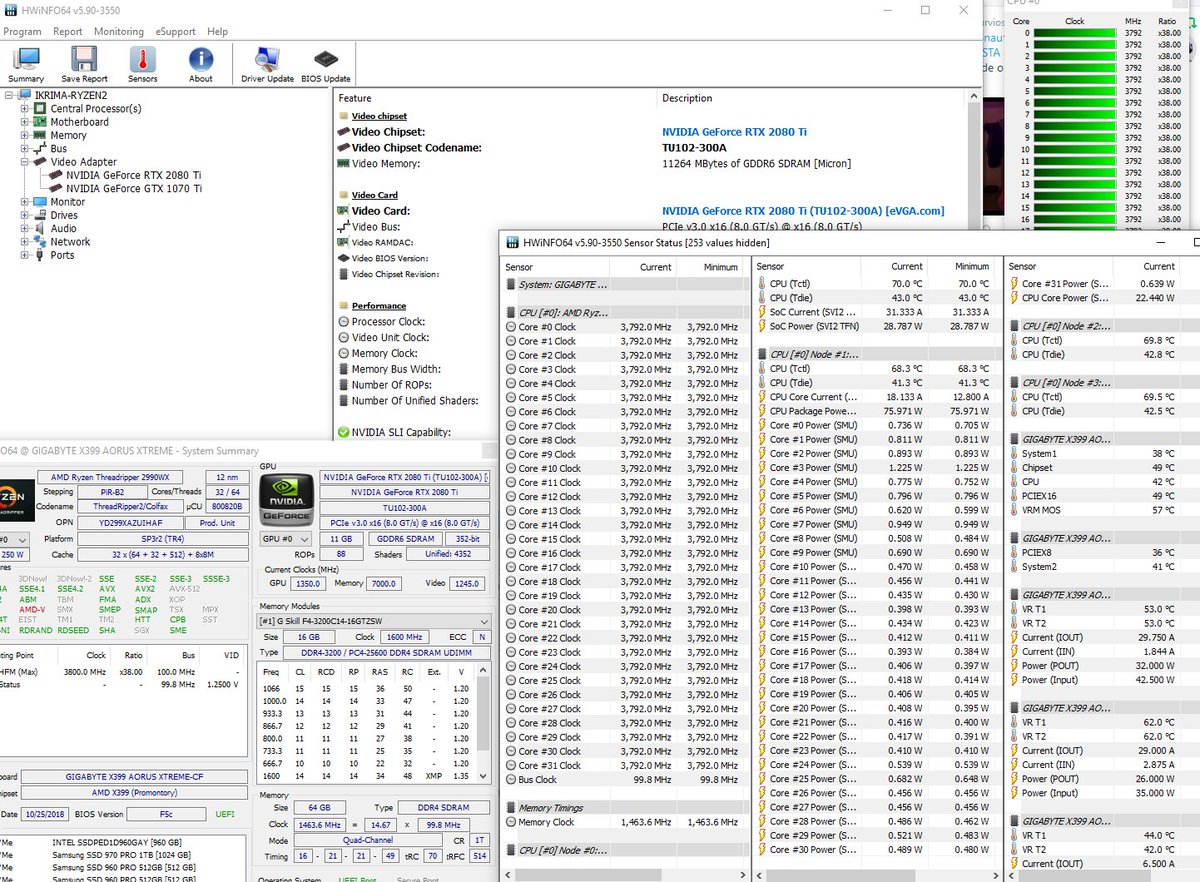Devbox Hardware Guide#
TLDR: Threadripper 2 high-end dev/workstation build guide covering:
- 2990 vs 1950x perf numbers
- compatibility issues
- @UnrealEngine fastbuild integration
- my poor mans' automating/baremetal provisioning
- the programs I use
After many years of holding out, I finally had to upgrade my dev machine to Win10 so figured it was as good a time to refresh my machine + consolidate the studio machines.
Here's the rat hole I went down for two weeks chasing compat issues, msvc compiler bugs, and solutions
Here's everything that finally worked together: Key parts:
- 2990WX that can be comfortably overclocked to 3.8ghz
- 64 gb RAM overclocked to 2933
- Main drive: Intel Optane
- If money isn't an issue, I can't recommend enough the intel optane drive for main + ssd raid for second drive. It's like an order of mag faster and makes day to day feel transformative
- What're the build improvements for optane?
- I'd say depends on what baseline is. Assuming src is built on optane drive: Optane vs HD - massive benefit Optane vs. SSD vs Raid-0 SSD - hard to say sans measuring. I noticed a massive improvement but that's colored by the terrible amd raid driver issue
- Also depends on CPU (32-core beast vs 4 core) & how multi-threaded your build is (msvc 2015 horrible, msvc2017 decent, fastbuild/incredibuild is great) That would all affect how much of a bottleneck your disk is going to be but really would need to measure since too many factors
- Biggest benefit of optane is insanely fast (3x more than next fastest ssd) random access read/writes with 4k blocks, 1 thread, quedepth 1. Net result is making it the primary drive makes windows "feel" a lot snappier
- Fast block storage drive: Raid-0 NVMe SSD x4
Ryzen has lots of PCI lanes but mobo pcie slots are not all x16. Lots of trial & error but optimal cfg:
- 2080ti goes in top PCIe
- 1070 goes in 2nd PCIe
- Why A Second Card? Mainly for live shader debugging/register inspection on single machine + I had a spare card. Other hopeful benefit is for mgpgpu stuff (houdini cloth sims) but I don't have concrete evidence lots of programs written for that outside of RedShift + Octane
- ASRock M2 Raid card in slot3 (need x16 for Raid-0 SSD)
- Optane in bottom
- Airflow setup in pic

Compatibility gremlins#
/u/AMD_Robert's reddit posts are a treasure trove of detailed technical information
HPET#
- Make sure
HPET = default
[!note]-
HPET default>=HPET off>>HPET on(causes inordinate perf problems)
- several system timing sources, primarily
TSCandHPETTSC: truly low overhead timing source using a CPU register to operateHPET: guaranteed timing source but high overhead- OS may mark
TSCas unstable/not to be trusted so system falls back toHPET- might be normal behavior because CPU was designed that way
- might be BIOS bug e.g. it writes to the register in an incorrect way, throwing the TSC sync off from the beginning of the boot process
- force disabling
HPETin bios and force enabling unstableTSCcauses a different set of problems- causes issues with graphics and overall stability
- distorts the system's understanding of time, possibly resulting invalid performance data
- might prevent
HPETsync induced stutters, but preventsTSCfrom syncing leading to global desynchronization overtime- kernel developer thoughts on HPET
- HPET vs PMT
- HPET default
bcdedit /deletevalue useplatformclock
- HPET off
bcdedit /deletevalue useplatformclock
bcdedit /set disabledynamictick yes
- HPET on
bcdedit /set useplatformclock true
bcdedit /set disabledynamictick no
- Credit to @SebAaltonen for root causing this
Finally found a solution to my Threadripper performance woes. If I disable HPET (bcdedit /deletevalue useplatformclock) I get 2x SSD iOPS boost, UE4 editor with RenderDoc plugin active has 4x higher frame rate and VTune becomes usable. Visual Studio stalls are also reduced.
Raid-0 NVMe SSD#
Do not install AMD Raid Xpert2 driver/chipset. It's atrocious; use the standard windows one. Means you can't have your OS on an SSD raid but Optane is better anyway
Details: ASRock Ultra Quad M.2 Card & AMD RAIDXpert Benchmark
Houdini 17.0#
Houdini 17.0 will crash with nVidia drivers have a clash and houdini won't recognize your cards as cuda devices. This has been fixed in the latest drivers
Memory#
- Rule of thumb is 2gb per core. For building UE4, I have to limit number of threads < 64 as I run out of memory and stuff starts paging out to disk
- Intel Optane drive is so fast it took me a bit to discover since the perf didn't tank an order of magnitude
- Get Samsung B-Die & buy kits together as mfg only guarantees timings for kits (eg get a kit of 16gbx4 vs 4 separate 16gb of same model) (benzhaomin.github.io/bdiefinder/)
- TR needs fast memory (also NUMA arch with only 4 mem channels for 8 dies)
- Reliably can only OC up to 2933mhz (officially 2133 iirc)
- conjecture Past certain point, pushing memspeed is net loss esp. since hw errors induced from very tight memory/CPU timings >> latency stalls from CPU requesting memory in a Quad Channel config
Overclocking#
Easy Mode#
AMD made it really easy with RyzenMaster
- Allows you to control clock settings
- Whether to force turn on or use Precision Boost Override 2 and define range of dynamic scaling
- NOTE: Some settings dont persist on restart
Precision Boost Overdrive 2 seems pretty great and allows for dynamic scaling switching at a much granular timeslice
Dynamic Local Mode which is auto-pinning your threads to core die that has local memory access to deal with NUMA arch of ryzen
I'm always suspect of these things but windows scheduler def. has issues. More on that later
Medium Mode (what I use)#
Dead simple:
- Just set clock multiplier to 38
- CPU voltage at 1.25
- Memory to 2933 with 1.35v
- NOTE: TR has a thermal ceiling of 69° before it'll start throttling
Here's a beginner's guide to overclocking
Expert mode#
Here's a Overclocking Threadripper Guide. Some advanced notes:
- Use Ryzen Timing Checker
- DRAM calculator to push your memory overclock to extreme
(imho, this is a losing proposition and not worth the effort) - Here's a tutorial:
OC software#
Tools#
- HWInfo: Best detailed info on all sorts of sensors & summary rolled into one
- GPU Caps Viewer: GPU capabilities
Benchmark#
- CPU: Aida64Extreme, CineBench, Indigo Benchmark
- SSD: Anvil SSD, ATTO, CrystalDiskMark
Stability#
BIG Shout out to @Level1Techs; hands down the best hw channel for technical people:
